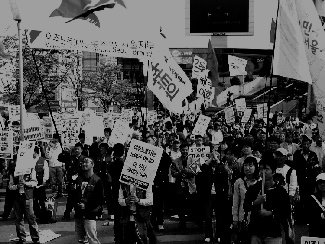An Overview of Revision to the Policies Regarding Migrant Workers
ㅇ On December 10, 2009 The rule that EPS workers must depart Korea for a month before extending their visas was deleted. Instead workers' visas may be extended for another two years (actually 1 year and 10 months), AT THE REQUEST OF THE EMPLOYERS without the worker leaving Korea. The limitation for the workplace transfer is three times for the first three years and two times for the re-employment period (1-yr 10 mo. extension period).
ㅇ However, the revised law also states that workplace transfers would not be counted if the reason for transfer was not due to the fault of the worker. According to the Ministry of Labor, this provision is to promote protection of foreign workers’ human rights.
ㅇ Brokers or Intermediaries
- Any person (Brokers) who interferes with a change of workplace or business by a foreign worker can be punished by imprisonment for up to one year and a fine not exceeding ten million won.
ㅇ Change of workplace: Period for Finding new Employment (effective Dec. 10, 2009)
- The period allowed for finding new employment granted when one changes workplace has been extended from two to three months.
*An additional extension may be applied for under the following conditions: occupational accident, disease, pregnancy, childbirth. This particular provision has already been written into law.
- Instead of 1-year contracts the revised law now allows the employer and the foreign worker to agree on a duration of employment contract within the limit of the given employment period (up until the end of the visa period).
ㅇ Criteria for Selection of Foreign Workers (effective April 10, 2010)
- The revised law provides legal grounds on which a skills test, in addition to a Korean language test, may be given to select foreign workers (the testing agency: Human Resources Development Service of Korea).
ㅇ Cancellation of the Written Confirmation on Exceptional Employment Eligibility, and Restriction on Employment of Foreign Workers (effective April 10, 2010)
- This provision serves to control and punish employers that acquired foreign labor with fake eligibility requirements and other fraud including wage, advanced placement (pre-arrangement of employment), etc.
ㅇ Retirement Benefit System Covers all the Work places (December 1, 2010)
The current revision now allows workers to receive separation pay or toejikgeum(퇴직금) from companies with less than 5 workers. An adjustment period from December 1, 2010 to December 31, 2012 will allow the employers to pay 50% of the premium and 100% will be charged starting in 2013.
ㅇ After Second Sojourn
- After finishing the second sojourn in Korea, a worker may re-apply after six months. However, the worker must be less than 39-years-old and must go through the process for finding a workplace in Korea from the beginning. (KLT exam, job matching, training, etc.)
ㅇ Exemption from Re-entry Permit Requirement (December 1, 2010.)
- Registered foreigners seeking to depart Korea and re-enter within one year will be exemption from the re-entry permit requirement.
※ If the period of stay is less than one year, the exemption is valid for the duration of the period of stay.
- Exemption for permanent residents (F-5) re-entering Korea will remain valid for two years after their departure date.
Although these policies have been revised, they either not go good enough or really bad for migrant workers. The restrictions that tie a worker to an employer are still in place. The deletion of the one month suspension of employment before visa extension proves to be a lot less beneficial to migrant workers because of the loss of more than a years worth of work opportunity. The restriction on workplace transfer seemed good, but the bureaucracy of the job centers and Ministry of Labor is still the major obstacle. Aside from business closure of the suspension of production, all other valid reasons for not counting a transfer are very difficult to prove. This means that transfers due to violence, unpaid wages, dangerous work conditions, illness, contract violations, all reasons very difficult to prove, end up being counted due to technicalities.
A lot of migrant workers have also become undocumented because of negligence on the part of employers and the lack of information. Quite a number of people will be excluded from the chance of re-employment after the first visa extension period because of the age restriction and competition from new applicants.
Some of the new laws may prove to be convenient, but this does not necessarily translate to proper enforcement. The rights of workers should first be enforced properly and the bad laws repealed.




